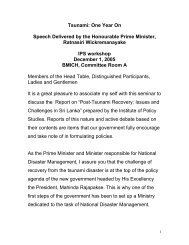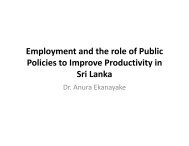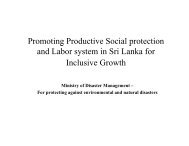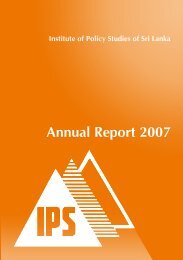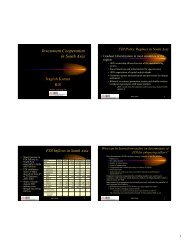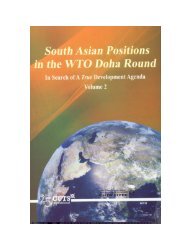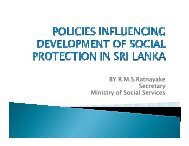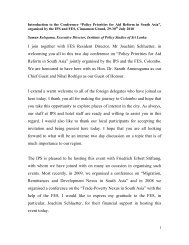IPS Research Themes__Post Tsunami Reconstruction & Disaster Management<strong>of</strong> National Disaster Management. The report received wide media publicity, and was also one <strong>of</strong> the mostdownloaded publications from the IPS website.High Quality Surveys Highlighting the Views <strong>of</strong> Tsunami Affected HouseholdsImmediately after the tsunami, IPS in collaboration with the Department <strong>of</strong> Census and Statistics and otherresearch agencies highlighted the role <strong>of</strong> good quality, objective survey work, which is sensitive to the state<strong>of</strong> the tsunami affected households. This was applied in a large assessment which IPS undertook for theWorld Bank on “Listening to Those Who Lost: Survey and Analysis <strong>of</strong> Rebuilding and Relocation <strong>of</strong> Tsunamiaffected Households in <strong>Sri</strong> <strong>Lanka</strong>”. The objective <strong>of</strong> this study was to analyse the views <strong>of</strong> tsunami survivorson post tsunami relocation and rebuilding decisions including key housing and land issues. The study reportwas launched on 12 August, with a press briefing at the IPS premises which received wide media attention.The findings <strong>of</strong> the study was also presented to All International Federations <strong>of</strong> the Red Cross.The IPS was an active member <strong>of</strong> the steering group which contributed to the government and donor reporton “Tsunami: Building Back Better? <strong>Sri</strong> <strong>Lanka</strong> Achievements, Challenges and Way Forward” published in<strong>2005</strong>. IPS also provided assistance to the government in the design <strong>of</strong> micro credit programmes in the posttsunami context.Designing an Effective All-hazards Early Warning System for <strong>Sri</strong> <strong>Lanka</strong>This research was done in partnership with LIRNEasia, a regional ICT policy and regulation capacity buildingentity based in <strong>Sri</strong> <strong>Lanka</strong>, and the Vanguard Centre for Disaster Preparedness following the tsunamidisaster.The objective <strong>of</strong> this research was to raise the awareness on key and urgent policy issues relating tothe development <strong>of</strong> a National Early Warning Mechanism. The output <strong>of</strong> the research included the following:• A concept paper titled: “National Early Warning System: <strong>Sri</strong> <strong>Lanka</strong> – a Participatory Concept Paper forthe Design <strong>of</strong> an Effective All-Hazards Warning System”, authored by Rohan Samarajiva & AyeshaZainudeen (LIRNEasia), Malathy Knight-John (IPS) and Peter Anderson (Simon Fraser University, Canada).• Presentations <strong>of</strong> the concept paper to a Presidential Commission set up to inquire into matters relating tothe Tsunami <strong>of</strong> December 2004 on 15 March and to the private sector at a workshop organized by theCeylon Chamber <strong>of</strong> Commerce on 17 February.• A TV panel interview on ALERT SRI LANKA, a YATV talk show aired on ETV on 19 and 20 <strong>of</strong> February.Research PersonnelPaul Steele, Dushni Weerakoon, Nisha Arunatilake, Malathy Knight-John,Asha Gunawardena and Dinusha Dharmaratne12__________ <strong>Annual</strong> <strong>Report</strong> <strong>2005</strong>
IPS Research ThemesInternational Economic <strong>Policy</strong>The increasingly closer integration <strong>of</strong> the global economy has made it imperative that developing countriesface the task <strong>of</strong> adapting the liberalization and globalization process to their own situations anddevelopment needs. It requires that they improve their domestictrade and financial regimes and equally importantly, they mustalso review the role they are playing in multilateral decisionmaking and work out approaches and actions that will enhancetheir cohesion and effectiveness on the international scene.The plethora <strong>of</strong> multilateral, regional and bilateral tradeliberalization measures in the pipeline will require policymakersto develop proposals relating to the implementation <strong>of</strong>agreements already reached, to new issues that have subsequentlyemerged, or to any new negotiating rounds proposed for the future.The IPS has emerged as a key player in assessing and formulatingpolicies with regard to <strong>Sri</strong> <strong>Lanka</strong>’s external trade strategies basedon its on-going research programme in the arena <strong>of</strong> internationaleconomics. To this end, the work programme identifies principalissues for further research in areas considered critical to maximizethe potential benefits <strong>of</strong> closer integration in the world economy.The key areas <strong>of</strong> on-going research include issues related to <strong>Sri</strong><strong>Lanka</strong>’s participation in multilateral negotiations <strong>of</strong> the WorldTrade Organization (WTO), bilateral and regional tradeagreements, impact <strong>of</strong> the phase-out <strong>of</strong> the Multi FibreArrangement (MFA) on the apparel sector and external sectorcompetitiveness.HighlightsWTO Doha Round NegotiationsThe IPS was the partner organization responsibe for preparingthe background paper on the area <strong>of</strong> trade facilitation for a studyon “WTO Doha Round and South Asia” which was initiated bythe Consumer Unity and Trust Society (CUTS), India. This studywas to be implemented in five South Asian countries, viz., India,<strong>Sri</strong> <strong>Lanka</strong>, Nepal, Pakistan and Bangladesh and focuses on fivekey elements <strong>of</strong> the July Framework Agreement <strong>of</strong> the WTO:agriculture, non-agricultural market access, developmentdimensions, services and trade facilitation.As a part <strong>of</strong> the effort to engage a wider debate and stimulate adialogue in the run up to the WTO Sixth Ministerial meeting <strong>of</strong>December <strong>2005</strong>, the IPS organized a workshop on “WTO DohaRound and South Asia: Linking Civil Society with TradePublications in <strong>2005</strong>Kelegama, S., “Regionalism Debate:Re-positioning SAFTA” (withRatnakar Adhikari), South AsianJournal, Vol. 7Kelegama, S., “WTO and RegionalTrade Arrangements’ in BibekDebroy and Mohammed Saquib(eds.), WTO at Ten: Looking Back toLook Beyond, Konark, IndiaKelegama, S., “Emerging Scenarioin North-South BTAs <strong>of</strong> SouthAsia”, Trade Insight, Vol. No. 3Kelegama, S., “South Asia after theQuota System: Impact <strong>of</strong> The MFAPhase-Out” edited Volume, OctoberKelegama, S., “Trade in Textile andApparel in South Asia” (withBilesha Weeraratne) in CENTAD(ed.), South Asian Year Book <strong>of</strong> Tradeand Development <strong>2005</strong>–MainstreamingDevelopment in Trade Negotiations:Run-Up Hong Kong, CENTAD, NewDelhi, IndiaKelegama, S. “Ready-MadeGarment Industry in <strong>Sri</strong> <strong>Lanka</strong>:Preparing to Face the GlobalChallenges”, Asia-Pacific Trade andInvestment Review, Vol. 1, No. 1,ESCAP, UN, AprilWeerakoon, D., and J. Thennakoon,“Trade Facilitation: A South AsianPerspective”, Trade Insight, Vol. 1.No. 4Weerakoon, D., J. Thennakoon andB. Weeraratne, “MultilateralAgreement on Trade Facilitation:An Important but Complex Agendafor South Asia”, in South AsianPositions in the WTO Doha Round: InSearch <strong>of</strong> a True Development Agenda,Jaipur: CUTS International13__________ <strong>Annual</strong> <strong>Report</strong> <strong>2005</strong>



